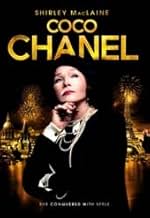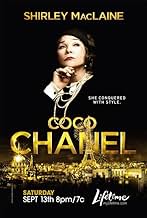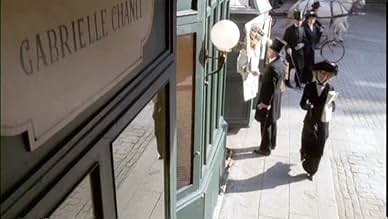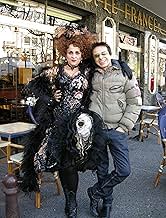IMDb रेटिंग
6.8/10
3.9 हज़ार
आपकी रेटिंग
अपनी भाषा में प्लॉट जोड़ेंThe life story of legendary fashion designer Coco Chanel.The life story of legendary fashion designer Coco Chanel.The life story of legendary fashion designer Coco Chanel.
- 2 प्राइमटाइम एमी के लिए नामांकित
- 2 जीत और कुल 8 नामांकन
Valeria Cavalli
- Elisabeth Ducrot
- (as Valéria Cavalli)
फ़ीचर्ड समीक्षाएं
I was enjoying the first half of the movie, but it started to drag by hour 2 with still some time on the clock...but it was a made-for-TV movie, so...
The younger Chanel was great, but Shirley MacClaine was a horrible choice for the older Coco. She may be a great actress but cannot pull off being a Frenchwoman! I cringed whenever she opened her mouth.
Finally, after the movie I did some research about the real Coco and the movie totally glossed over her antisemitism, homophobia, and pro-Nazism. It is hard for me to think of her as icon after learning that. Of course, the irony is that Chanel is now headed by two Jewish men whom she previously derided.
The younger Chanel was great, but Shirley MacClaine was a horrible choice for the older Coco. She may be a great actress but cannot pull off being a Frenchwoman! I cringed whenever she opened her mouth.
Finally, after the movie I did some research about the real Coco and the movie totally glossed over her antisemitism, homophobia, and pro-Nazism. It is hard for me to think of her as icon after learning that. Of course, the irony is that Chanel is now headed by two Jewish men whom she previously derided.
tho I will not deny the qualities as the rag to riches movie, it is not really true to make it a real bio pic CoCo never really had such hard times to get ahead- tho the collectors was a nice touch..she had lovers and used her sexuality from the start, so the "hard beginnings" were not that hard. omitted is the part when in the war times she was a mistress of a nazi officer and accused of collaboration. damaging her reputation in native France, recovered and ignored in the States othrewise quite a pleasant movie..p-ity it ignored real facts..not a fairy tale but a woman who succeeded all the means she had available and survived...a bit of truth would make this movie generally stronger and would not hurt Co cO's rise to success as a strong woman, a survivor at all costs, in the end a rich but lonely woman
If you want to travel to another era and get a full introduction to the world of fashion, here's a great way to do it.
Even if it is a melodrama, it's so well made, with such obsession with detail, refinement, (as Chanel's works, by the way) that you can't but fall for Coco's challenges. And yet it doesn't shy away from her daily struggles. As a business student, I couldn't help noticing how often she was verging on bankruptcy, and how she came out of it with a mixture of audacity, being at the right places and yes, bedding rich gentlemen "above her station" as a Victorian would put it.
Music is fine, as is of course, wardrobe and photography. Being from Argentina, I found a happy curiosity that there are a couple of tangos and Argentina is mentioned twice, as a "land of hope". The first company mentioned on the titles that produced this film is called "Pampa", I suppose it must have something to do with it.
Barbora Bobulova is stunning as young Cocó. Probably more likable besides more beautiful than Audrieu Tatou, with which obviously one is drawn to compare it all the time. Both are fine, probably "Cocó avant Chanel" emphasizes the sad and grim aspects more, whereas this version, being longer, can indulge into more romance and yet show us, for instance, what happened to her beloved sister, something absent from the feature film. Also in this version we see the origin of the famous perfume N 5 and her famous "little black dress". Étienne Balsan and Boy Capel are totally different in both films. So much they almost look like if one of the two films got it all wrong. Étienne in particular is always amiable and respectful to Cocó here, whereas on "avant Chanel" Poelvoorde makes a perfect "good for nothing spoilt boy who never grew up". Boy is also given much more screen time and importance here. Emilienne d'Alencon is barely shown here, and the game of differences could go on and on. I suppose purists and people who really know the real story will love one story and hate the other. But for us newbies both are surprisingly enjoyable. I understand Mc Laine got all the prizes but in my opinion Boulova should have got them.
My "favourite little moment" is how the beautiful countess who lost everything becomes her shrewd "royal secretary", even suggesting her it'd be advantageous for Cocó for "everybody loves nobility. Specially in a republic". I suppose it's a worthy lesson on how money matters are fleeting indeed. I could only wonder, if this is a TV series, what would they have made were they given the ample resources of a feature film...
Even if it is a melodrama, it's so well made, with such obsession with detail, refinement, (as Chanel's works, by the way) that you can't but fall for Coco's challenges. And yet it doesn't shy away from her daily struggles. As a business student, I couldn't help noticing how often she was verging on bankruptcy, and how she came out of it with a mixture of audacity, being at the right places and yes, bedding rich gentlemen "above her station" as a Victorian would put it.
Music is fine, as is of course, wardrobe and photography. Being from Argentina, I found a happy curiosity that there are a couple of tangos and Argentina is mentioned twice, as a "land of hope". The first company mentioned on the titles that produced this film is called "Pampa", I suppose it must have something to do with it.
Barbora Bobulova is stunning as young Cocó. Probably more likable besides more beautiful than Audrieu Tatou, with which obviously one is drawn to compare it all the time. Both are fine, probably "Cocó avant Chanel" emphasizes the sad and grim aspects more, whereas this version, being longer, can indulge into more romance and yet show us, for instance, what happened to her beloved sister, something absent from the feature film. Also in this version we see the origin of the famous perfume N 5 and her famous "little black dress". Étienne Balsan and Boy Capel are totally different in both films. So much they almost look like if one of the two films got it all wrong. Étienne in particular is always amiable and respectful to Cocó here, whereas on "avant Chanel" Poelvoorde makes a perfect "good for nothing spoilt boy who never grew up". Boy is also given much more screen time and importance here. Emilienne d'Alencon is barely shown here, and the game of differences could go on and on. I suppose purists and people who really know the real story will love one story and hate the other. But for us newbies both are surprisingly enjoyable. I understand Mc Laine got all the prizes but in my opinion Boulova should have got them.
My "favourite little moment" is how the beautiful countess who lost everything becomes her shrewd "royal secretary", even suggesting her it'd be advantageous for Cocó for "everybody loves nobility. Specially in a republic". I suppose it's a worthy lesson on how money matters are fleeting indeed. I could only wonder, if this is a TV series, what would they have made were they given the ample resources of a feature film...
I'm rating Lifetime's "Coco Chanel" 9/10 as a creative made-for-TV biopic. Yes, all reviews are subjective. However, I suspect that some folks who have berated the movie on the IMDb boards and on other websites may have become confused by thinking that Shirley MacLaine in the title role means the film should be judged for Oscar-worthiness. To that, I respond with a resounding NO! The first time I sat down to watch "Coco Chanel," I knew to hook up the coffeemaker and have a plate of my favorite store-brand cookies on hand, as there's no patisserie nearby where I can grab a flaky pain au chocolat.
My point is I wanted an old-fashioned love story and a Coco Chanel séance, and by God I got both thanks to Shirley MacLaine pretending to be the first lady of the House of Chanel. And I'm glad that Lifetime tackled the project. I pass (out) on the network's dime-a-dozen, women-in-peril movies; only to be outdone by my tabby, who hurls fur balls at the sound of the first cello chord. Seriously, what I love about Lifetime are the quirky, chick-lit-style romances ("Cake" immediately comes to mind) and the historical romances. "Coco Chanel" is best-suited in the latter category.
That the iconoclastic MacLaine portrays the title character makes for a riveting character study accentuated with progressive statements about femininity in male-dominated society (France, in this movie) and about the courage for disenfranchised people of male or female persuasion to be independent-minded as they strive for success. Besides MacLaine, perhaps only Fanny Ardant could have masterfully ("mistressfully"?) channeled Coco Chanel for this Lifetime drama. I mention Ardant's name because I recently watched her in two previously released movies -- "Nathalie," opposite Emmanuelle Beart, and "Paris Je T'aime," the multi-directed cinematic kiss to the city's erotic magnetism. But it is MacLaine in the role, and we get to watch wide-eyed as she magnifies Chanelisms on the small screen.
Through MacLaine's haunting performance of a mature Coco (circa 1954) and Barbora Bobulova's vulnerable delivery playing a young Coco, we are transported back-and-forth in time. The flashbacks are employed effectively, enabling us viewers to sympathize with the mature Coco's regrets about the past, beginning with MacLaine batting her sparkling eyes over a demitasse of espresso or whatever. In the other direction, the flashbacks in "Coco Chanel" allow us viewers to discover how an orphaned girl blossomed into the woman who chiseled her way from France to America to stand out as *the* fashion diva of the early- to mid-20th century. Let's remember that Coco had the balls to wear hats *and* pants. And she had a custom-designed quip for any man -- or woman, for that matter -- who challenged her unconventional ways. You go, Coco! Ahem, back to my review. ...
Currently, "Coco Chanel" is back on cable via the Lifetime On Demand lineup in my area. Tonight is my third time watching the movie in just as many days. Every time I watch the biopic, I am enthralled by its three-pronged approach. To illustrate: 1) Without Mademoiselle Chanel's trailblazing contributions to the history of fashion, where, oh where, would we gals be without our costume jewelry and little black dress? Don't get me started on scarves, though the tragic story of modern-dance pioneer Isadora Duncan offers a bizarre discouragement to favoring *that* kind of accessory. Still, Chanel may have been the first one to say "Accessorize, accessorize, accessorize" -- albeit in French.
2) The torn-between-two-lovers story arc gets the blood pumping in the right direction because it: a) creates titillating plot tension, b) evokes that deceptively innocent-sounding ballad sung by Mary MacGregor in 1977, and c) offers Harlequin-style romantic scenes between beauteous brunette Barbora Bobulova and either of her knights in shifty armor: Sagamore Stevenin (as "Etienne") and Olivier Sitruk (as "Boy" -- oh boy, oh boy, oh, boy!); and 3) Coco's drivenness as an artist is salient in the drama. Against obstacles endemic to social-class prejudice, she bravely struggles between pursuing her art (hat making, her first love) and earning her bread-and-butter (seamstress work).
Ironically, today when many of us think of the Chanel name, the couture fragrance intermingled with Catherine Deneuve's face and platinum blonde hair may come to mind instead of Coco's groundbreaking signature fashions. Lifetime's "Coco Chanel" seems to indicate that the visionary entrepreneur ventured into the olfactory branch of the fashion world reluctantly, and much later in life. It's apropos, though, for a dab here and there of Chanel No. 5 means a woman is wearing it well. And that, my friends, is an exquisite ode to Coco Chanel's lingering legacy. Well, that and being able to have an extended stay at the Hotel Ritz in Paris.
My point is I wanted an old-fashioned love story and a Coco Chanel séance, and by God I got both thanks to Shirley MacLaine pretending to be the first lady of the House of Chanel. And I'm glad that Lifetime tackled the project. I pass (out) on the network's dime-a-dozen, women-in-peril movies; only to be outdone by my tabby, who hurls fur balls at the sound of the first cello chord. Seriously, what I love about Lifetime are the quirky, chick-lit-style romances ("Cake" immediately comes to mind) and the historical romances. "Coco Chanel" is best-suited in the latter category.
That the iconoclastic MacLaine portrays the title character makes for a riveting character study accentuated with progressive statements about femininity in male-dominated society (France, in this movie) and about the courage for disenfranchised people of male or female persuasion to be independent-minded as they strive for success. Besides MacLaine, perhaps only Fanny Ardant could have masterfully ("mistressfully"?) channeled Coco Chanel for this Lifetime drama. I mention Ardant's name because I recently watched her in two previously released movies -- "Nathalie," opposite Emmanuelle Beart, and "Paris Je T'aime," the multi-directed cinematic kiss to the city's erotic magnetism. But it is MacLaine in the role, and we get to watch wide-eyed as she magnifies Chanelisms on the small screen.
Through MacLaine's haunting performance of a mature Coco (circa 1954) and Barbora Bobulova's vulnerable delivery playing a young Coco, we are transported back-and-forth in time. The flashbacks are employed effectively, enabling us viewers to sympathize with the mature Coco's regrets about the past, beginning with MacLaine batting her sparkling eyes over a demitasse of espresso or whatever. In the other direction, the flashbacks in "Coco Chanel" allow us viewers to discover how an orphaned girl blossomed into the woman who chiseled her way from France to America to stand out as *the* fashion diva of the early- to mid-20th century. Let's remember that Coco had the balls to wear hats *and* pants. And she had a custom-designed quip for any man -- or woman, for that matter -- who challenged her unconventional ways. You go, Coco! Ahem, back to my review. ...
Currently, "Coco Chanel" is back on cable via the Lifetime On Demand lineup in my area. Tonight is my third time watching the movie in just as many days. Every time I watch the biopic, I am enthralled by its three-pronged approach. To illustrate: 1) Without Mademoiselle Chanel's trailblazing contributions to the history of fashion, where, oh where, would we gals be without our costume jewelry and little black dress? Don't get me started on scarves, though the tragic story of modern-dance pioneer Isadora Duncan offers a bizarre discouragement to favoring *that* kind of accessory. Still, Chanel may have been the first one to say "Accessorize, accessorize, accessorize" -- albeit in French.
2) The torn-between-two-lovers story arc gets the blood pumping in the right direction because it: a) creates titillating plot tension, b) evokes that deceptively innocent-sounding ballad sung by Mary MacGregor in 1977, and c) offers Harlequin-style romantic scenes between beauteous brunette Barbora Bobulova and either of her knights in shifty armor: Sagamore Stevenin (as "Etienne") and Olivier Sitruk (as "Boy" -- oh boy, oh boy, oh, boy!); and 3) Coco's drivenness as an artist is salient in the drama. Against obstacles endemic to social-class prejudice, she bravely struggles between pursuing her art (hat making, her first love) and earning her bread-and-butter (seamstress work).
Ironically, today when many of us think of the Chanel name, the couture fragrance intermingled with Catherine Deneuve's face and platinum blonde hair may come to mind instead of Coco's groundbreaking signature fashions. Lifetime's "Coco Chanel" seems to indicate that the visionary entrepreneur ventured into the olfactory branch of the fashion world reluctantly, and much later in life. It's apropos, though, for a dab here and there of Chanel No. 5 means a woman is wearing it well. And that, my friends, is an exquisite ode to Coco Chanel's lingering legacy. Well, that and being able to have an extended stay at the Hotel Ritz in Paris.
A biographic film basically loyal to the true history of the pioneering French fashion designer who created the word " Haute Couture" and spread the spiritual Chanel Numero 5 to the whole world is bound to be arresting to movie lovers no matter they are fond of pursuing vogue in beau monde. And the truth is that it's inspiring and engaging. For one thing, Coco Chanel gave women a sense of freedom; gave them back their bodies that were drenched in sweat due to fashion's finery, lace, corsets, underclothes and padding. For another, she insists on woman's independence which may be achieved via true career. Also the two actresses gave the excellent rendition of this legendary woman.
क्या आपको पता है
- ट्रिवियाDaria Baykalova's debut.
- गूफ़In Deauville, the newspaper headline announcing the outbreak of the war incorrectly states, "Archduke Francis Joseph" had been assassinated in Sarajevo. Francis (Franz) Joseph was the reigning Austrian emperor and was most certainly not assassinated. His nephew and heir to the empire, Francis (Franz) Ferdinand was assassinated.
- कनेक्शनFeatured in 15th Annual Screen Actors Guild Awards (2009)
टॉप पसंद
रेटिंग देने के लिए साइन-इन करें और वैयक्तिकृत सुझावों के लिए वॉचलिस्ट करें
विवरण
इस पेज में योगदान दें
किसी बदलाव का सुझाव दें या अनुपलब्ध कॉन्टेंट जोड़ें
































